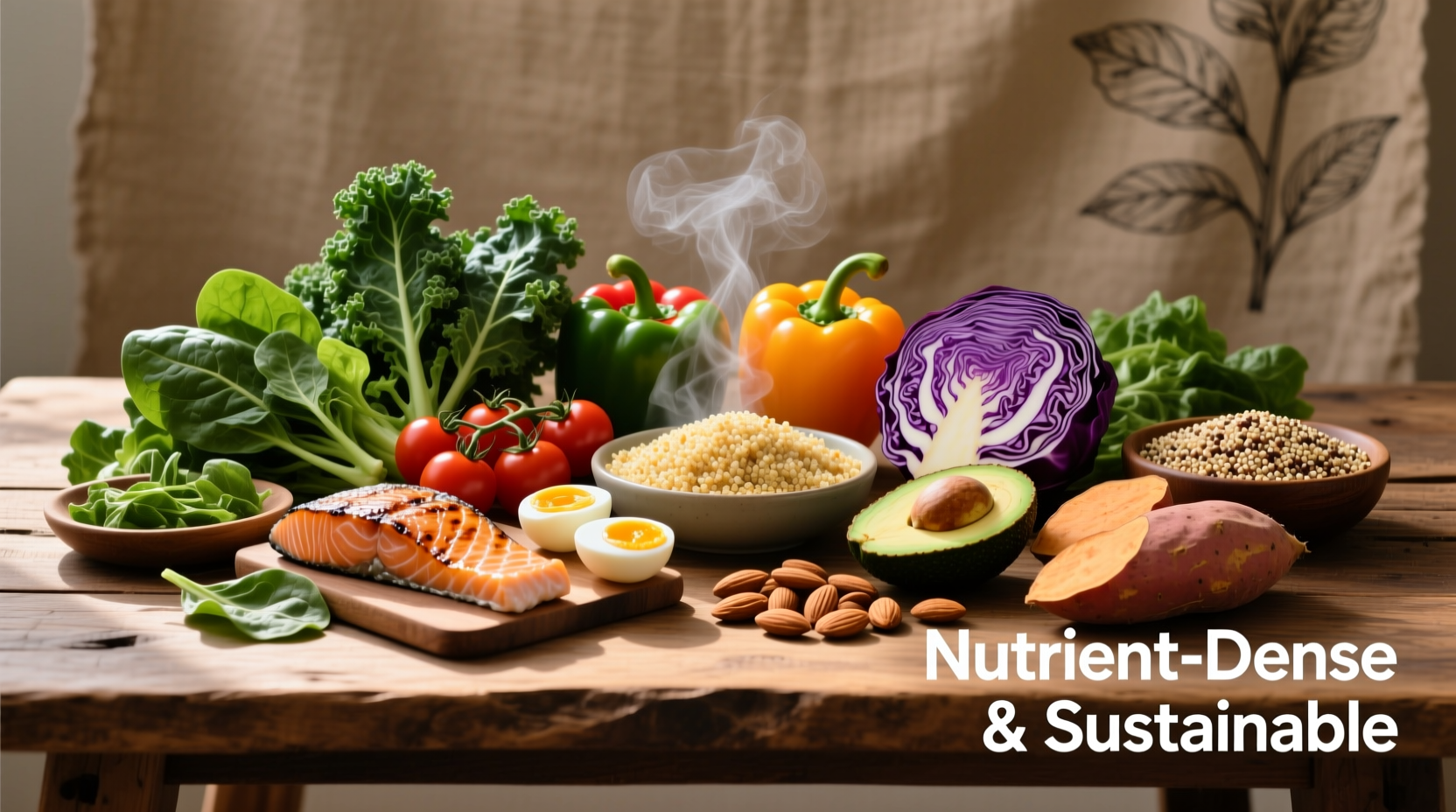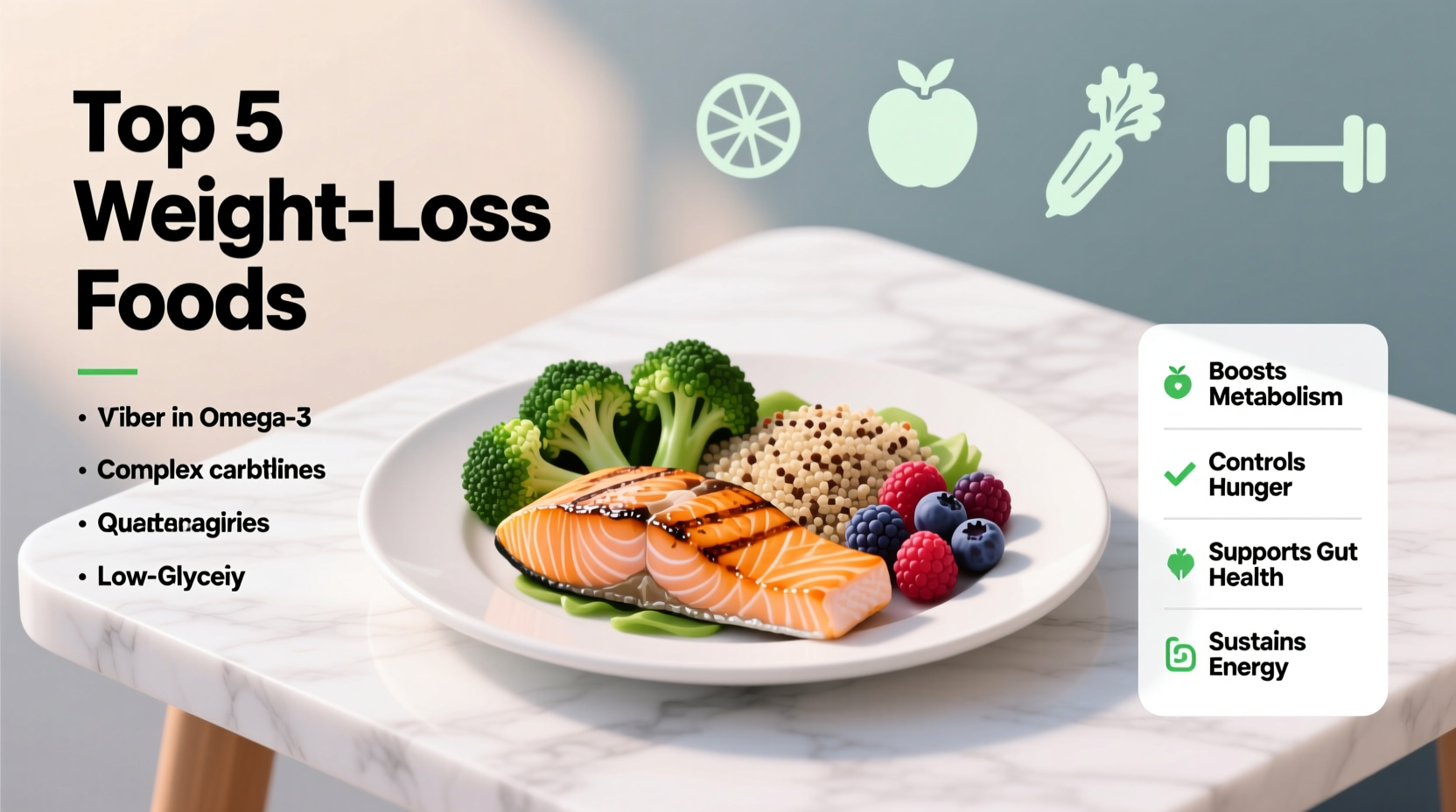The most effective foods for weight loss include high-protein options like eggs and Greek yogurt, fiber-rich vegetables such as broccoli and leafy greens, healthy fats from avocados and nuts, and whole grains like quinoa. These foods promote satiety, stabilize blood sugar, and provide essential nutrients while creating a natural calorie deficit. Research shows that focusing on whole, minimally processed foods rather than specific 'diet' products leads to sustainable weight loss.
Your Immediate Action Plan: What to Eat Today
Starting your weight loss journey begins with smart food choices you can implement immediately. Forget restrictive diets or miracle solutions—science shows that certain foods naturally support weight management by increasing fullness, stabilizing blood sugar, and providing essential nutrients without excess calories. According to a comprehensive review by Harvard T.H. Chan School of Public Health, dietary patterns emphasizing whole foods consistently outperform fad diets for sustainable weight loss (Harvard T.H. Chan School of Public Health, 2023).
Begin with these evidence-backed choices today:
- Protein-rich breakfasts: Two eggs with spinach provides 13g protein and keeps you full 30% longer than a carb-heavy breakfast
- High-volume vegetables: Fill half your plate with non-starchy vegetables like broccoli, zucchini, or bell peppers
- Smart snacks: Greek yogurt with berries instead of processed bars

Why These Foods Actually Work: The Science Simplified
Understanding the mechanisms behind weight loss foods transforms random choices into strategic decisions. The National Institutes of Health confirms that food quality—not just calorie counting—significantly impacts weight management outcomes (NIH, 2024).
Protein Power: Your Satiety Secret Weapon
High-protein foods trigger the release of satiety hormones like peptide YY and GLP-1 while reducing ghrelin (the hunger hormone). A landmark study in the American Journal of Clinical Nutrition found that increasing protein from 15% to 30% of daily calories resulted in automatic 441 fewer calories consumed daily (Leidy et al., 2015).
| Protein Source | Protein per Serving | Satiety Index Score | Practical Serving Size |
|---|---|---|---|
| Eggs | 6g per large egg | 150% (highest) | 2 eggs |
| Greek Yogurt | 17g per 170g | 118% | 1 cup |
| Salmon | 22g per 3oz | 119% | 3-4oz fillet |
| Lentils | 9g per ½ cup | 133% | 1 cup cooked |
Satiety Index based on Holt et al. study comparing foods' ability to reduce hunger (white bread = 100%)
Fiber's Dual Action: Volume and Gut Health
Soluble fiber forms a gel-like substance that slows digestion, while insoluble fiber adds bulk. Both mechanisms increase fullness and reduce calorie absorption. Research published in Annals of Internal Medicine demonstrated that simply aiming for 30g of fiber daily resulted in comparable weight loss to complex diet plans (McRae, 2015).
Your Practical Implementation Framework
Knowledge becomes power only when applied effectively. Here's how to integrate weight loss foods into your daily routine without feeling deprived.
Strategic Meal Composition
Follow the plate method used by registered dietitians: ½ plate non-starchy vegetables, ¼ plate lean protein, ¼ plate complex carbohydrates. This simple visual cue automatically balances your meals for optimal weight management.
Smart Swaps for Common Cravings
Address specific cravings with science-backed alternatives:
- Sweet cravings: Replace candy with frozen grapes or dark chocolate (70%+ cocoa)
- Crunch cravings: Choose roasted chickpeas instead of chips
- Creamy cravings: Opt for avocado slices rather than mayo-based dressings
Timing Considerations That Actually Matter
While total daily intake matters most, research from the American Heart Association suggests that front-loading calories (eating larger breakfasts, smaller dinners) may support weight loss (American Heart Association, 2021). Aim for 40% of daily calories at breakfast, 30% at lunch, and 30% at dinner.
Navigating Common Pitfalls: What Most People Get Wrong
Even with the right foods, weight loss can stall. Understanding these context boundaries prevents frustration.
When Healthy Foods Backfire
Nuts and avocados, while excellent for weight loss, contain concentrated calories. A recent study in Obesity journal found that without portion control, these foods can contribute to weight gain (Mistretta et al., 2020). Stick to these portions:
- Almonds: 23 nuts (1 oz)
- Avocado: ⅓ medium fruit
- Nut butter: 2 tablespoons
Individual Variability in Food Responses
Research from the Weizmann Institute shows significant individual variation in blood sugar responses to identical foods (Zeevi et al., 2015). While oats generally support weight loss, some people experience blood sugar spikes that increase hunger. Track your personal responses to optimize your food choices.
Sustainable Weight Management: Beyond the Initial Loss
Maintaining weight loss proves more challenging than the initial reduction for 80% of people. The National Weight Control Registry tracks successful maintainers who share these food patterns:
- Consistent breakfast consumption (90% of registry members)
- Regular inclusion of produce at every meal
- Mindful indulgences (75% allow planned treats)
- Flexible approach rather than rigid dieting
Remember: The goal isn't perfection but consistent progress. A study in Diabetes Care found that maintaining 90% adherence to healthy eating patterns yields better long-term results than 100% adherence followed by burnout (Thomas et al., 2016).
Frequently Asked Questions
Here are answers to the most common weight loss food questions based on current nutritional science:
Can I eat carbohydrates and still lose weight?
Yes, carbohydrates can be part of successful weight loss when chosen wisely. Focus on complex carbohydrates with high fiber content like quinoa, oats, and sweet potatoes rather than refined carbs. The key is portion control and timing—pair carbs with protein and fat to slow digestion and prevent blood sugar spikes. Research shows that low-carb diets aren't necessarily superior to moderate-carb approaches for long-term weight management when calories are controlled.
How much protein do I really need for weight loss?
The optimal protein intake for weight loss ranges from 1.2-2.2 grams per kilogram of body weight daily, depending on activity level. For most adults, this translates to 20-30 grams of protein per meal. A study in the Journal of the Academy of Nutrition and Dietetics found that distributing protein evenly across meals maximizes muscle preservation during weight loss, which helps maintain metabolic rate. Exceeding 2.5g/kg daily provides no additional weight loss benefit for most people.
Are 'negative calorie foods' real for weight loss?
The concept of 'negative calorie foods' (foods requiring more energy to digest than they provide) is a myth. While low-calorie, high-fiber foods like celery, cucumbers, and leafy greens have minimal caloric impact and promote fullness, they don't create an actual calorie deficit through digestion. However, incorporating these high-volume, low-energy-density foods can help reduce overall calorie intake by increasing meal volume without adding significant calories, which supports weight loss when used as part of a balanced approach.
Should I avoid all fats when trying to lose weight?
No, healthy fats are essential for sustainable weight loss. Fats provide satiety, help absorb fat-soluble vitamins, and support hormone balance. Research shows that diets including moderate amounts of healthy fats (20-35% of total calories) from sources like avocados, nuts, seeds, and olive oil lead to better long-term weight loss adherence than very low-fat diets. The key is choosing unsaturated fats while limiting saturated fats and avoiding trans fats completely.











 浙公网安备
33010002000092号
浙公网安备
33010002000092号 浙B2-20120091-4
浙B2-20120091-4